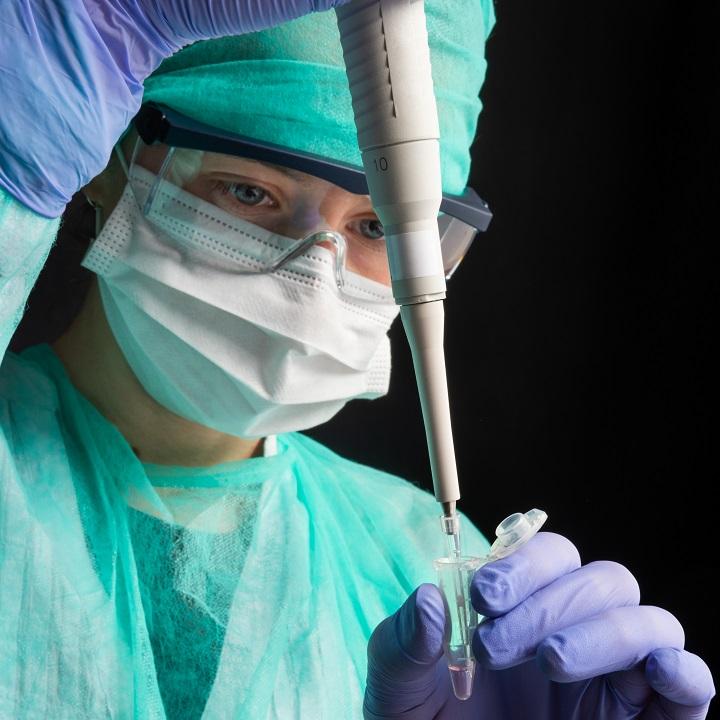IDEXX Reference Laboratories

IDEXX SARS-CoV-2
(COVID-19) RealPCR Test
For rare cases in accordance with guidance from the APHA
In rare cases where ALL the following criteria are met, testing an animal for SARS-COV-2 infection may be helpful for the veterinary surgeon, pet and owner:
- The animal is a domestic Felid, Canid or Mustelinae
- It is exhibiting a combination of the following signs as determined by a veterinary surgeon
- Respiratory infection
- Gastrointestinal infection
- Fever
- Other common diagnoses have been considered and discounted by a veterinary surgeon
- The animal has had confirmed contact with a suspect or known human case of COVID-19 within 3 weeks of developing clinical signs
For use in rare cases to confirm or rule out COVID-19 infection in pets
Leading health authorities and IDEXX veterinary experts agree that transmission of the SARS-CoV-2 virus is primarily person to person and advise against testing asymptomatic pets. In symptomatic pets, it is more likely that disease is caused by a more common respiratory infection than by SARS-CoV-2.14
While there is currently no evidence that dogs or cats play a role in transmitting the disease to humans, growing clinical evidence suggest there may be varying levels of susceptibility to infection in animals. Recent peer-reviewed research also showed cats and ferrets may be more susceptible to clinical infections while dogs generally seem more resistant to infection.8-11
When to test
Leading health authorities and IDEXX veterinary experts agree that transmission of the SARS-CoV-2 virus is primarily person to person and advise against testing asymptomatic pets. Even in symptomatic pets, it is more likely that disease is caused by a more common respiratory infection than by SARS-CoV-2.14
IDEXX's guidance, aligned with that of the APHA is that veterinary surgeon should only order the IDEXX SARS-CoV-2 RealPCR Test when ALL the following criteria are met:
- The animal is a domestic Felid, Canid or Mustelinae
AND
- It is exhibiting a combination of the following clinical signs as determined by a veterinary surgeon
- Respiratory infection
- Gastrointestinal infection
- Fever
AND
- Other common diagnoses have been considered and discounted by a veterinary surgeon
AND
- The animal has had confirmed contact with a suspect or known human case of COVID-19 within 3 weeks of developing clinical signs
For more detailed information, please see our diagnostic update.
IDEXX wholly endorses the recommendation of the Royal College of Veterinary Surgeons (RCVS) found on their website that states, ‘you should only undertake testing for SARS-COV-2 in animals where it is in the interest of the health and welfare of the animal and is in line with APHA guidance. It should not be a screening test.
How to order
Instructions for submitting specimens for the IDEXX SARS-CoV-2 (COVID-19) RealPCR Test
World Health Organization (WHO) and the International Air Transport Association (IATA) issued the following guidance:
“Clinical (non-propagated) samples from suspected or confirmed COVID-19 cases are assigned to UN 3373, Biological Substance, Category B, unless the countries of origin, transit, or destination have issued national recommendations defining them otherwise.”
The shipping material and the packaging instructions that we provide for any regular sample are in line with UN 3373. Please strictly follow these instructions and don´t hesitate to contact us, should you have any questions.
Not an IDEXX customer? Please contact a representative for assistance in setting up an account.
Test names and codes
Test code: COVIDP |
IDEXX SARS-CoV-2 (COVID-19) RealPCR Test |
Test code: COVIDPFU |
IDEXX SARS-CoV-2 (COVID-19) RealPCR Test Add-onAdd on to a prior RealPCR test or panel |
Please write the test code manually on the order form.
Test for more common causes of respiratory illness to be considered prior to testing for SARs-CoV-2 (COVID-19)
Canine Upper Respiratory PCR Panel
Canine Adenovirus type 2 PCR, Canine Distempervirus PCR, Canine Herpesvirus (CHV-1) PCR, Canine
Parainfluenza Virus Type 3 PCR, Canine Influenza Virus PCR, Canine Respiratory Coronavirus PCR, Bordetella bronchiseptica PCR.
| Code– CRP1 |
Canine Upper Respiratory PCR Panel plus bacterial culture
| Code– CRPC |
Upper Respiratory PCR Panel 1 (Feline)
Chlamydia felis PCR, FHV-1 PCR, Calicivirus PCR
|
Code– FUR1 |
Upper Respiratory PCR Panel 1 plus bacterial culture (Feline)
|
Code– FU1C |
Upper Respiratory PCR Panel 2 (Feline)
Chlamydia felis PCR, FHV-1 PCR, Calicivirus PCR, Mycoplasma felis PCR, Bordetella bronchiseptica PCR
Code: FUR2
|
Code– FUR2 |
Upper Respiratory PCR Panel 2 plus bacterial culture (Feline)
|
Code– FU2C |
Specimen submission guidelines
SARS-CoV-2 specimen collection guidelines
You are encouraged to consult with public health authorities for the latest guidelines on safely collecting specimens prior to testing for SARS-CoV-2 in a pet. The use of personal protective equipment (PPE) including gloves, mask, gown and eye protection is recommended when collecting specimens from a pet in which SARS-CoV-2 infection is suspected.
The ideal specimen should be based on clinical presentation and purpose for testing.
- Based on current scientific knowledge The APHA recommends oropharyngeal and rectal swabs as the only suitable specimen types for the detection of SARS-CoV-2 infection in animals. IDEXX recommends that an oropharyngeal swab +/- rectal swab be submitted along with any other samples submitted as this may be required to be forwarded to APHA in the instance of a positive result.
- For respiratory manifestations: deep pharyngeal swab (with visible organic material on swab; please rub firmly) and a conjunctival swab (wipe eye clean, swab inside of eyelid). If the patient is cooperative, a swab from the caudal nasal cavity may also be included. Please submit dry, plastic-stemmed swabs, without transport media; keep refrigerated.
- For gastrointestinal manifestations: 3-5 g (1 g minimum) fresh faeces in a sterile container and deep pharyngeal swab (with visible organic material on swab; please rub firmly) and a conjunctival swab (wipe eye clean, swab inside of eyelid). Please submit dry, plastic-stemmed swabs, without transport media; keep refrigerated.
- No distinct clinical signs (e.g. public health investigations): 3-5 g (1 g minimum) fresh faeces in a sterile container and deep pharyngeal swab (with visible organic material on swab; please rub firmly), conjunctival swab (wipe eye clean, swab inside of eyelid) and caudal nasal swab.
Specimen requirements
Deep pharyngeal swab (with visible organic material on swab; please rub firmly) and a conjunctival swab (wipe eye clean, swab inside of eyelid). Please submit dry, plastic-stemmed swabs, without transport media; keep refrigerated.
Additional specimens for IDEXX SARS-CoV-2 (COVID-19) RealPCR test: if the patient is cooperative, a swab from the caudal nasal cavity may also be included. If gastrointestinal signs are present, also include 3-5 g (1 g minimum) fresh faeces in a sterile tube.
Reporting requirements
What are the reporting requirements for a positive IDEXX SARS-CoV-2 (COVID-19) RealPCR Test?
SARS-CoV-2 is currently a reportable disease in animals in the UK. Veterinary Surgeons have a regulatory obligation to report positive test results to the competent authority (in GB, Animal and Plant Health Agency, APHA; and in Northern Ireland, the Department for Agriculture, Environment and Rural Affairs, DAERA). Please see the APHA guidelines for specific contact information.
Support and resources
Turnaround time
Preliminary results in 3-4 days; allow additional time for confirmation of SARS-CoV-2 PCR positive results.
Customer support services
IDEXX supports your practice with our customer support, technical support and medical consulting services team.
0203 7887 508

What is PCR?
Polymerase chain reaction (PCR) testing identifies the presence of a pathogen’s DNA or RNA in a patient specimen. PCR is highly sensitive and specific testing that can confirm the actual presence of an organism.
PCR results facilitate early detection of disease in sick animals:
- Often positive in infected animals before an antibody can be detected

Additional resources
White paper: Clinical evidence suggesting varying levels of susceptibility to SARS-CoV-2 (COVID-19) virus infection in animals
Diagnostic resource: Coronavirus diagnostic update, April 2020
Public health and other non-customer inquiries: Click here
References
- Centers for Disease Control and Prevention. Coronavirus Disease 2019 (COVID-19). www.cdc.gov/COVID19. Accessed April 16, 2020.
- World Health Organization. Coronavirus disease (COVID-19) outbreak. www.who.int/emergencies/diseases/novel-coronavirus-2019. Accessed April 16, 2020.
- American Veterinary Medical Association. COVID-19: What veterinarians need to know. www.avma.org/coronavirus. Accessed April 16, 2020.
- World Small Animal Veterinary Association (WSAVA). The new coronavirus and companion animals—advice for WSAVA members. www.wsava.org/news/highlighted-news/the-new-coronavirus-and-companion-animals-advice-for-wsava-members. Accessed April 16, 2020.
- Ong SWX, Tan YK, Chia PY, et al. Air, surface environmental, and personal protective equipment contamination by serve acute respiratory syndrome coronavirus 2 (SARS-CoV-2) from a symptomatic patient [published online ahead of print March 4, 2020]. JAMA. 2020;e203227. doi:10.1001/jama.2020.3227
- van Doremalen N, Bushmaker Y, Morris DH, et al. Aerosol and surface stability of SARS-COV-2 as compared with SARS-CoV-1. N Engl J Med. 2020;382(16):1564–1567. doi:10.1056/NEJMc2004973
- Wan Y, Shang J, Graham R, Baric RS, Li F. Receptor recognition by the novel coronavirus from Wuhan: An analysis based on decade-long structural studies of SARS coronavirus. J Virol. 2020;94(7):e00127-20. doi:10.1128/JVI.00127-20
- Shi J, Wen Z, Zhong G, et al. Susceptibility of ferrets, cats, dogs and other domesticated animals to SARS-coronavirus 2. Science. 2020;eabb7015. doi:10.1126/science.abb7015
- Kim Y, Kim SG, Kim SM, et al. Infection and rapid transmission of SARS-CoV-2 in ferrets [published online ahead of print April 5, 2020]. Cell Host Microbe. 2020;S1931-3128(20)30187-6. doi:10.1016/j.chom.2020.03.023
- Questions and answers on the 2019 coronavirus disease (COVID-19): Surveillance and events in animals. World Organisation for Animal Health (OIE) website. www.oie.int/en/scientific-expertise/specific-information-and-recommendations/questions-and-answers-on-2019novel-coronavirus. Updated April 9, 2020. Accessed April 16, 2020.
- USDA Cases of SARS-CoV-2 in Animals in the United States. USDA Animal and Plate Health Inspection Service website. https://www.aphis.usda.gov/aphis/dashboards/tableau/sars-dashboard. Updated February 15, 2021. Accessed March 16, 2021.
- OIE Statement on COVID-19 and Mink. OIE World Organisation for Animal Health website. https://www.oie.int/en/for-the-media/press-releases/detail/article/oie-statement-on-covid-19-and-mink/. Accessed March 16, 2021.
- Low-level of infection with COVID-19 in pet dog [news release]. Hong Kong: Government of the Hong Kong Special Administrative Region; March 4, 2020. www.info.gov.hk/gia/general/202003/04/P2020030400658.htm. Accessed April 16, 2020.
- Journal of Small Animal Practice (2020), 1-7: Frequency of respiratory pathogens and SARS-CoV-2 in canine and feline samples submitted for respiratory testing in early 2020. doi: 10.1111/jsap.13300.
PCR testing is a service performed pursuant to an agreement with Roche Molecular Systems, Inc.